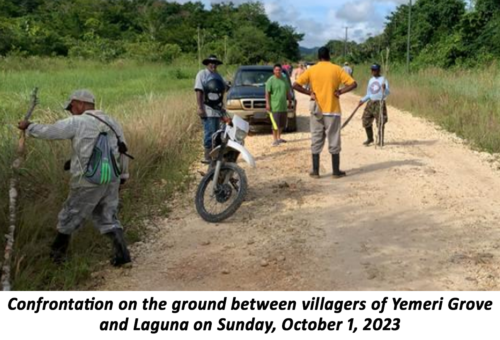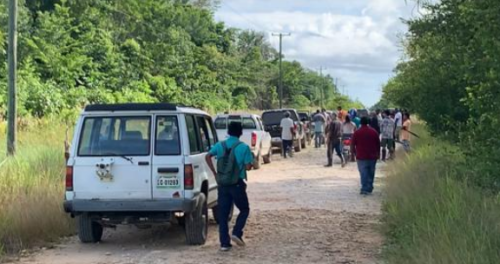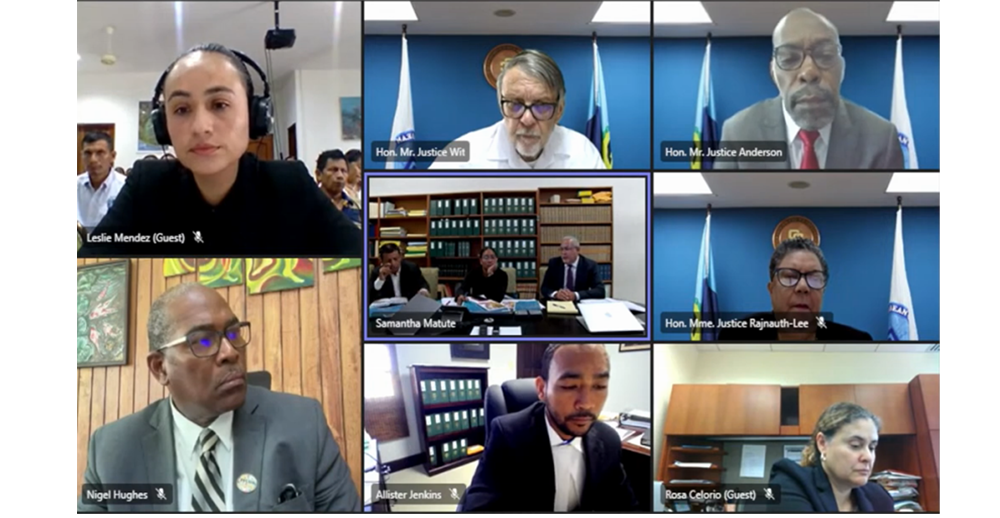Photo: Compliance hearing of the CCJ for the Maya Land Rights case
BELIZE CITY, Thurs. Oct. 5, 2023
At a compliance hearing of the Caribbean Court of Justice (CCJ) on the Maya Land Rights case on Wednesday, the Court urged the parties to conclude the implementation of the Consent Order by April 2025. That date would be one decade removed from April 2015 when the CCJ affirmed that Maya villages in Toledo have communal land rights. As such, shortened timelines were agreed for concrete steps to be taken to conclude the implementation within the remaining 18 months.


Over a third of Wednesday’s monitoring hearing focused on the latest flare-up between multi-ethnic village, Yemeri Grove and the Maya village of Laguna along the Southern Highway. Over the weekend, there was a confrontation between machete-wielding members of the two villages and their leaders. During the compliance hearing, Leslie Mendez, counsel for the appellants (Maya Leaders Alliance and Toledo Alcaldes Association along with the 23 villages), described the situation on the ground as scary. She noted that the confrontation has escalated with an increasing number of people who “are now on Laguna’s land claiming they have interest in that land.” According to Mendez, on Sunday, October 1, there were at least 80 to 100 persons on the ground taking over land, some of them not even from Yemeri Grove. She later emphasized that while Laguna “has a legally recognized claim to customary land tenure, Yemeri cannot say the same. What Yemeri Grove is claiming essentially is national land.” The Yemeri residents, led by Village Chairman Herald Usher, are accused of going to the disputed territory and placing pegs to indicate a distribution of land to villagers. Similarly, Laguna villagers were accused, in April of this year, of placing concrete pillars on the same disputed land.
At Wednesday’s CCJ compliance hearing, the parties agreed that there should be a mechanism to address flare-ups at the same time that the delimitation of village boundaries is being worked out. The two sides were to be brought together today by Senior Counsel Andrew Marshalleck who represents the Government of Belize in the case, CEO Tanya Santos of the Ministry of Indigenous Peoples’ Affairs, Deputy Commissioner of Lands Alfred Cal, and representatives from the Ministry of Rural Development and the Attorney General’s Ministry. However, reports to Amandala are that officials met first with representatives of Laguna, as the village leaders for Yemeri Grove arrived after. We are told that an attempt will be made to bring the two sides together tomorrow, Friday, October 6. There is also a tentative meeting for next week Thursday, where it is expected that several ministers from the different ministries would be in attendance. The Court has requested that the Government submit reports on the outcome of those meetings.
Marshalleck says that a mechanism to consider is an interim arrangement like a tribunal that would address boundary disputes on the ground. The Court asked that this matter be discussed with the two parties during the two meetings.
Marshalleck emphasizes that the problem is not bringing the parties together to discuss; rather, it’s that neither party is willing to budge from its position. He said, “We’ll come out of that room with the same problem as we did months ago.” In the case of Yemeri, he says they have forwarded a map asserting its village boundaries, while Laguna is “using language that suggests that it’s a foregone conclusion what the boundaries are.” He noted that what they lack are principles by which the village boundaries will be delimited, and the two parties must agree on those principles. Marshalleck said if the two villages cannot agree on said principles, then the Government would have to impose those while respecting the consultation process with the Maya villages. For her part, Mendez believes that if the parties cannot reach an agreement, the delimitation principles must be determined via an independent mechanism and not imposed by the Government. The judges then indicated that if either party disagrees with any decision handed down about where the boundary line is, they can challenge it in the courts of Belize.
Another issue of concern raised by the appellants is in relation to the Draft Maya Land Tenure Policy which is now being circulated by the Government of Belize in the different villages as part of its consultation. Attorney Mendez says the Government sees the “appellants’ involvement as incidental to the process” and they were not given a schedule of the consultations. Marshalleck responded that the policy, once drafted, was sent to the appellants first and they have since submitted comments and recommendations. He added that villages who want the appellants present have invited them for their respective consultations. He emphasized that the consultations are expected to be completed within another month or so, and they should have another draft by April 2024.
The process of implementation of the Consent Order also features a constitutional and legislative aspect. Legislation will have to be enacted to give effect to the Consent Order. The biggest aspect to be addressed is how the Government will treat with Maya communal land rights alongside third-party rights, given the thousands of third-party landowners who have been awarded title by the Government in areas claimed by the Mayas. Notably, the Government is proposing a constitutional amendment to deal with this aspect which would address the arbitrary deprivation of property. The proposal is to limit the financial liability of the Government as it relates to compensation to be paid to one party or another. Marshalleck pointed to a recent decision of the Court of Appeal, “which has confirmed our thinking, which was that Maya land tenure cannot subsist alongside titles that have already been issued. In that case, where tenure is claimed in respect of land – in respect to which a title has been issued by the government – the question becomes whether that land has to be retaken and given to the Maya people, or whether the customary tenure needs to be extinguished and the title upheld. Either way, you have financial consequences and, because we’ve not been clear on defining these things, or the effect of it, the best that could be said was that, as necessary, constitutional changes would also be considered at the time to try to limit the financial consequences of the implementation. Because we envision that those claims for compensation can be quite substantial.”
Importantly, presiding CCJ Justice Hon. Jacob Wit remarked that “every Belizean needs to accept the legal situation and that legal situation has been formed by the Consent Order of the Government at the time and the Judgment of the Court. That’s the final decision on this area.”
There will be another compliance hearing beginning at 9:00 a.m. on November 30, 2023. Ahead of that date, the parties must submit several reports, including recommendations by the appellants regarding the observation by Marshalleck that the process of auto-delimitation of village boundaries is too slow and therefore not working. He pointed out that so far, only three villages have completed their delimitation process. The appellants will also make recommendations on resolving the sticking point of third-party rights alongside customary rights. The Government has been asked to submit within one week a revised road map of timelines for the implementation of the Consent Order.

